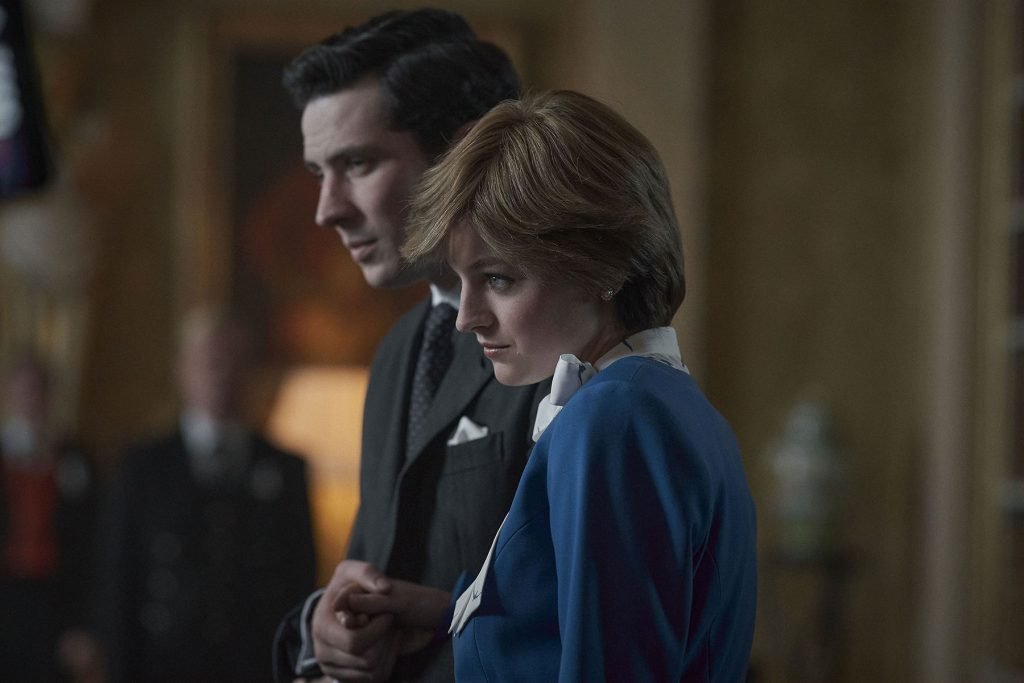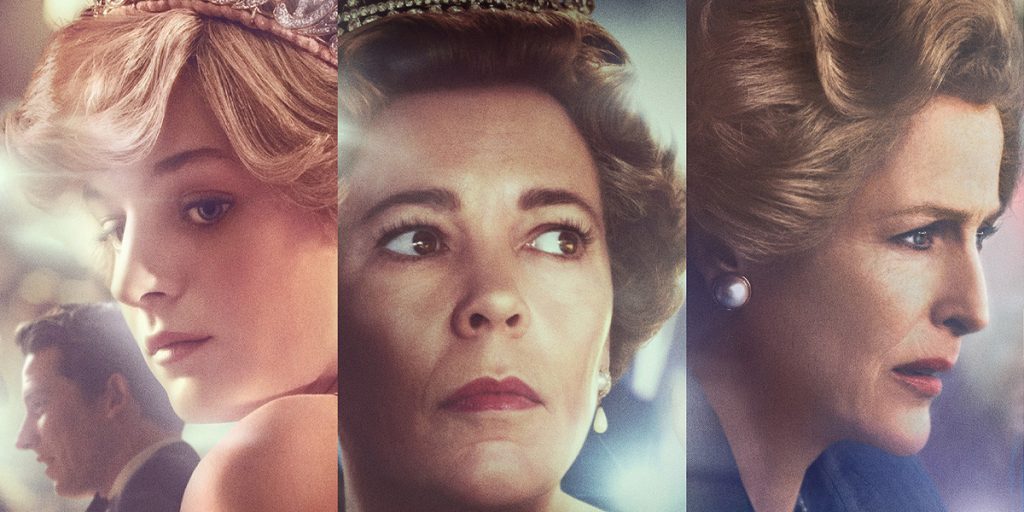The Crown Season 4 continues to challenge our notions of the royal family and lays bare the dark and gritty reality of our romanticised and idealised memories.
The release of ‘The Crown’ Season 4 was highly anticipated, as it marked the arrival of two powerhouses of women on set, who truly defined the 80s and 90s in Britain. Both blonde, blue-eyed, fond of blue suits, critical of the monarchy, and terribly isolated within the royal family. Cut from opposite ends of the same cloth, Margaret Thatcher (played by Gilian Anderson, The Fall, X-Files) and Diana, the Princess of Wales, (played by Emma Corrin, Pennyworth) massively uprooted the stiff status quo prevalent in the monarchy and in the country, and have changed our perceptions of both forever. I truly commend the casting team, Nina Gold and Robert Sterne, for finding the modern-day reincarnations of these two formidable women, as not only do they look like their originals, but their mannerisms and spirits are so accurate that even Diana’s biographer, Andrew Morton, gave the season his seal of approval. It is no wonder then that this season might possibly be the best one yet, even-though it breaks severely with the known formula of the previous three seasons.
Where the narrative arcs in Seasons 1 to 3 followed a steady procession of historical events of the time and political storylines, Season 4 focuses more on a crisis-of-the-week: think Thatcher digging her heels into apartheid, Diana and Charles’ (Josh O’Connor, God’s Own Country, Only You) fateful skiing trip, the Queen’s (Olivia Colman, The Favourite, Broadchurch) existential crisis when it comes to her motherly abilities, and so forth. This, in turn, results in a nuanced focus on inner turmoil, and leaves room for the exploration of feeling and opinion, as opposed to the rather more documentary style portrayal of a warm but calculated Queen Elizabeth.
The foregrounded presence of the singular prime minister is a refreshing change of the, till this point, subservient and replaceable predecessors. Even-though Season 4 covers an astonishingly large historical ground (the assassination of Earl Mountbatten by the IRA, general elections, Thatcherism, the Falklands War, two Royal Weddings (and divorces..), division between Britain and the Commonwealth and the ascendency of the Princess of Wales), there is perhaps more to be found in what is left out. But beware, writer and creator Peter Morgan (The Queen, The Last King of Scotland) certainly makes it clear on whose side of history he is on.

As with all other eagerly awaited seasons of an enthralling series, the swift arrival of ‘The Crown‘ Season 4 certainly loosened quite some tongues. Members of the royal family for one, were not at all pleased with their portrayal on the fictionalised historical drama. Ministers were even calling for a fiction content warning to be added at the start of each episode. Now that the series is hitting more closely to home, it was to be expected that a confrontation with a rather dramatized and fictionalized version of events would not go down well for the image of certain people. Prince Charles, for example, is presented as some sort of masochistic Casanova who ruins everyone’s happiness with his broken-little-boy tendencies. But, to be fair to The Crown, Diana’s idealized image of an “angel of the people” is balanced with depictions of her eating disorder (those episodes do have a content warning), and growing despair as she finds herself standing at a black abyss of isolation.
If you expected Diana’s storyline to be one big foreshadowing of her fate (which will certainly be one of the big features of Season 5!), you will be sorely disappointed. Even if Season 4 might feel crumbling at the edges at times, which is eerily similar to how the monarchy and society under Thatcher were disintegrating in the 1980s, one of its main credits is to give character and depth to the people we inadvertently dehumanized. I am convinced the slow-burn approach in Season 4 will only strengthen the earth-shattering ramifications of events to come in Season 5. Though Emma Corrin makes way for Elizabeth Debicki (Tenet, Vita & Virginia) to become Diana, there is still hope for a return of Gilian Anderson as Thatcher (as Claire Foy’s Queen Elizabeth has made a brief appearance in “Favourites”). One of the most tension building elements of the season hides in a clever trick of plotting, where Diana and Thatcher alternate episodes just as one is beginning to overstay her welcome. With two vastly different women, it keeps the season exciting and the viewer on its toes.
Having binge watched all four seasons in close to two weeks (absolutely no regrets!), there are a few disconcerting things I noticed which marks this season as a definite turn in atmosphere for The Crown. Whereas the past seasons deal with vastly different times, the closer we get to modern times the more painfully obvious it becomes that certain thinking is not just old-fashioned, it is positively sexist and out of touch with the modern world. However much I love The Crown, I couldn’t help but watch it, at times, with a shocked you-can’t-be-serious expression. For example, while Queen Elizabeth hopes to become friends and build a relationship with Margaret Thatcher, her husband Philip smirks at the notion of “two menopausal women running the country”. Even Thatcher herself shudders at the thought of women in power positions, as “they become too emotional”. A sign of the time perhaps, but it also shows how the monarchy is not exactly leading society into a new age. A sense of purpose to serve the Queen is another element that permeates the series, and how a life of privileged, pre-determined emptiness can be a disastrous source of depression.
Keeping in mind the series’ focus on failure instead of fulfilled duties, The Crown’s Season 4 can be a rather grim watch for the more pessimistic viewer. Gone are the grand displays of wealth and affluence encaptured in riveting parties and whirlwind affairs. Here, we see a monarchy who is failing at raising well-adjusted children (Queen Elizabeth), failing at leading a happy life (Margaret, Helena Bonham Carter, Harry Potter series, Enola Holmes), failing to represent the people (the British Government) and above all, failing to stay relevant (the monarchy). While Queen Elizabeth maintains tradition and order in an untraditional world, the cracks in the polished world of the royal family and the world around them at times briefly shine through as in the episode “Flagan”. Though the royal family still shuns a public portrayal of emotions (the queen describes Charles and Diana as “two spoilt, immature people, endlessly complaining unnecessarily”), there are subtle changes that do break with tradition. The distinct pronunciation of the royal’s A has finally been replaced to the more commoner’s pronunciation of E. The existential exploration of the royal family in Season 4 sure signals promising growth for Season 5.

